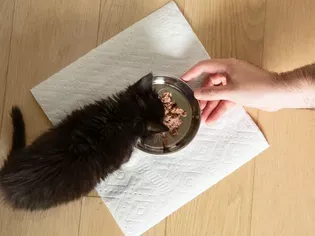Why Your Cat Paws the Floor After Eating
Updated on 04/26/24

Why Does My Cat Paw the Floor After Eating? Unraveling the Feline Phenomenon
Cats are fascinating creatures with unique behaviors that often leave us curious and wondering about their motivations. One such behavior is pawing the floor after eating. While it may seem like a simple gesture, this behavior can actually provide valuable insights into your cat's health and well-being. In this comprehensive guide, we delve into the intriguing reasons why cats paw the floor after eating, exploring both common and potential underlying medical conditions.
Common Reasons for Floor Pawing After Eating
1. Ingestive Grooming
After a satisfying meal, cats engage in a ritualistic behavior called ingestive grooming. This involves licking their paws and then rubbing them over their face and body to clean themselves. Pawing the floor after eating is a natural extension of this grooming process, as cats use their paws to remove food residue from their fur.
Example: Your cat finishes eating her favorite tuna dinner and meticulously licks her paws. She then proceeds to paw the floor a few times, rubbing her paws on the carpet to clean any lingering tuna bits from her face.
2. Sensory Exploration
Cats are curious creatures with a keen sense of smell and taste. Pawing the floor after eating can be a way for them to explore the sensory experience of their meal. The texture and smell of the floor can provide additional stimulation, enhancing their post-meal enjoyment.
Example: Your cat has just devoured a bowl of kibble. As he finishes his meal, he hops off the counter and starts pawing the hardwood floor, rubbing his paws back and forth to absorb the remaining kibble scent.
3. Marking Territory
Cats have scent glands in their paws, which they use to mark their territory. Pawing the floor after eating could be a way for them to deposit their scent and claim the area around their food bowl as their own. This behavior is more common in multi-cat households where cats establish their dominance hierarchy.
Example: In a household with multiple cats, one cat may paw the floor after eating to mark its territory around the food bowl, deterring other cats from approaching.
Potential Underlying Medical Conditions
While floor pawing after eating is typically a harmless behavior, in some cases, it can be a sign of underlying medical conditions. If you notice that your cat is excessively pawing the floor after eating or exhibiting other unusual behaviors, it's important to consult with a veterinarian.
1. Dental Disease
Dental problems, such as gum disease or tooth pain, can cause discomfort while eating. Your cat may paw the floor after eating to alleviate the pain or discomfort in their mouth.
Example: Your cat has been experiencing dental pain and has difficulty chewing its food. After eating, it starts pawing the floor excessively, showing signs of discomfort.
2. Gastrointestinal Issues
Gastrointestinal problems, such as nausea or indigestion, can also lead to floor pawing after eating. Your cat may be trying to soothe its stomach or relieve gas by pawing the floor.
Example: Your cat has been experiencing digestive issues and frequently vomits after eating. It also starts pawing the floor excessively after each meal.
3. Stress or Anxiety
Stress or anxiety can manifest in various ways in cats, including floor pawing after eating. If your cat is stressed or anxious about its mealtime environment or other factors, it may engage in this behavior as a coping mechanism.
Example: Your cat has recently experienced a change in its routine or environment and has become more anxious. It starts pawing the floor after eating, showing signs of stress.
Conclusion
Understanding why your cat paws the floor after eating can provide valuable insights into its behavior and well-being. While it is typically a harmless behavior, it's important to be aware of potential underlying medical conditions and consult with a veterinarian if you notice any unusual or excessive floor pawing. By addressing the underlying原因, you can help ensure your furry companion's health and happiness.
Explore More Pets

Cat Behavior Problems
How to Stop Aggression in Kittens

Long-Haired Cat Breeds
Siberian Cat: Breed Profile, Characteristics, & Care

Cat Behavior Problems
How to Stop Kittens From Scratching and Biting

Long-Haired Cat Breeds
Turkish Angora: Cat Breed Profile, Characteristics & Care

Basic Training
How to Socialize Your Kitten

Short-Haired Cat Breeds
Cute Pictures & Facts About Calico Cats & Kittens

Litter Box Training
Training Your Kitten to Use the Litter Box

Long-Haired Cat Breeds
10 Fun Facts About White Cats